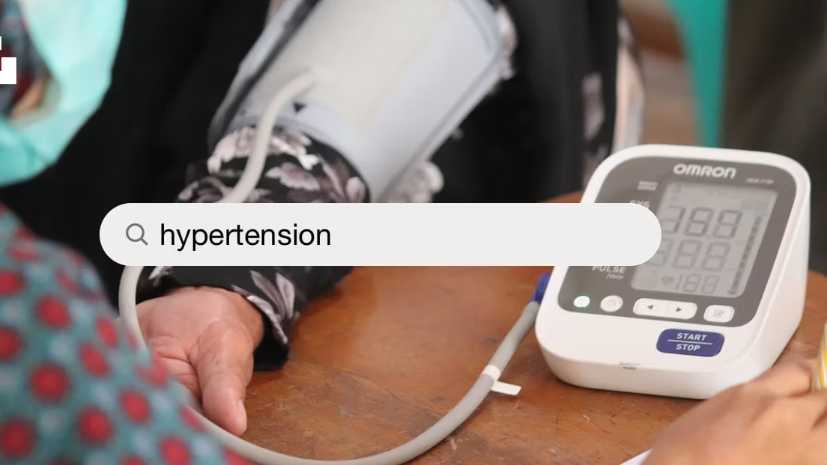Hypertension, or high blood pressure, is a chronic medical condition associated with persistently elevated blood pressure levels. Due to its asymptomatic nature is commonly called the "silent killer" & poses a significant global health risk. Hypertension that is not under control can result in severe complications such as coronary artery disease, stroke, & renal dysfunction, highlighting the significance of controlling blood pressure levels.
However, how does diet contribute to the management of this condition? Hypertension diets are aimed to lower blood pressure & minimise cardiovascular risk. Smart eating choices & diet for hypertension patient may improve cardiovascular health & perhaps prevent or control high blood pressure.
Explore how a hypertension diet & food for high blood pressure may help lower blood pressure & avoid cardiac problems.
Understanding the Role of Diet in High Blood Pressure Management
Diet is crucial to the management of high blood pressure (Blood pressure higher than 180/120 mm Hg). Unhealthy diets high in salt, saturated fats, & added sweets raise blood pressure. In contrast, adopting a healthy diet (foods that lower blood pressure) can effectively reduce blood pressure & the associated risk of complications. This is best home remedies for blood pressure.
The DASH Diet: Introduction & Benefits

Dietary Approaches to Stop Hypertension (DASH) is one of the most recommended dietary strategies for managing hypertension. The DASH diet has been shown to reduce blood pressure & enhance cardiovascular health substantially.
The DASH diet emphasizes consuming fruits, vegetables, whole cereals, lean proteins, & low-fat dairy products. It emphasizes limiting sodium intake & includes high-nutrient foods such as potassium, magnesium, & calcium.
Key Components of the DASH Diet:
|
Food Group |
Examples |
Benefits |
|
Fruits |
Berries, citrus fruits, apples, bananas |
High in potassium, a mineral that helps regulate blood pressure |
|
Vegetables |
Leafy greens, broccoli, carrots, tomatoes |
Rich in nitrates, which support blood vessel health |
|
Whole grains |
Brown rice, whole wheat bread, oats, quinoa |
Provide magnesium, a nutrient that helps relax blood vessels |
|
Lean proteins |
Skinless poultry, fish, beans, lentils |
Low in saturated fats, reducing the risk of cardiovascular diseases |
|
Low-fat dairy |
Skim milk, yogurt, reduced-fat cheeses |
Contain bioactive peptides that help manage blood pressure |
|
Healthy fats |
Avocados, nuts, seeds, olive oil |
Rich in monounsaturated fats that promote heart health |
|
Herbs & spices |
Turmeric, cinnamon, ginger, rosemary |
Contain anti-inflammatory & antioxidant properties |
Mediterranean Diet: Introduction & Benefits
Another popular diet for managing high blood pressure is the Mediterranean diet (MD). The MD is based on Mediterranean nations' dietary customs. It emphasizes whole & unadulterated foods, such as fruits, vegetables, whole cereals, legumes, fish, & olive oil.
The MD diet for hypertension patient has been linked to numerous health benefits, including decreased blood pressure & a reduced risk of cardiovascular disease.
Key Components of the Mediterranean Diet:
|
Food Group |
Examples |
Benefits |
|
Fruits & vegetables |
Tomatoes, cucumbers, bell peppers, spinach |
Rich in antioxidants that help reduce oxidative stress & inflammation |
|
Whole grains |
Whole wheat bread, brown rice, quinoa, oats |
High in dietary fiber, which supports healthy blood pressure levels |
|
Legumes |
Chickpeas, lentils, beans |
Excellent source of plant-based protein & fiber, which promote heart health |
|
Nuts & seeds |
Almonds, walnuts, flaxseeds |
Provide healthy fats, omega-3 fatty acids, & antioxidants, which support cardiovascular health |
|
Olive oil |
Extra virgin olive oil |
Rich in monounsaturated fats & beneficial plant compounds that promote heart health |
|
Fish & seafood |
Salmon, sardines, shrimp |
Good source of omega-3 fatty acids & lean protein, which have cardio-protective effects |
|
Poultry |
Chicken, turkey |
Lean protein option with less saturated fat, supporting cardiovascular health |
|
Dairy products |
Greek yogurt, feta cheese |
Provides calcium & protein, important for heart & bone health |
|
Herbs & spices |
Basil, oregano, garlic, turmeric |
Contain bioactive compounds with anti-inflammatory & antioxidant properties |
Research-Based Analysis On Dietary Patterns BP Control Food
Dietary Patterns
- Multiple studies & populations, including those with hypertension & obesity, have consistently demonstrated the DASH diet's blood pressure-lowering effects.
- The Mediterranean diet, abundant in monounsaturated fats from olive oil & legumes, has also been shown to reduce blood pressure.
- Combining a healthy diet, such as DASH or Mediterranean, with other lifestyle interventions, such as weight loss, can increase the blood pressure-lowering effects.
Macronutrients:
- Protein supplementation or substitution has been shown to reduce blood pressure. Increasing dietary protein intake or replacing carbohydrates with protein has demonstrated consistent blood pressure-lowering effects.
- Consumption of fat, particularly monounsaturated fats & omega-3 polyunsaturated fatty acids bp control food, has been linked to reduced blood pressure. Systolic blood pressure decreases when saturated fats are replaced with monounsaturated fats like olive & canola oils.
- BP control food such as Omega-3 fatty acids from fish oils lower blood pressure, particularly in hypertensives. This is achieved by decreasing inflammation, increasing endothelial function, & vasodilating.
Micronutrients:
- There is a strong positive correlation between sodium intake & blood pressure levels. To reduce blood pressure, it is recommended to reduce sodium intake because excess sodium can contribute to fluid retention & increased blood volume.
- Potassium supplementation or increased consumption of potassium-rich foods has been shown to reduce blood pressure. Potassium counteracts sodium's adverse effects by promoting vasodilation, relaxing blood vessels, & enhancing kidney function.
- Magnesium supplementation has demonstrated modest blood pressure reductions. Magnesium regulates blood pressure by relaxing blood vessels, regulating blood sugar & insulin levels, & enhancing endothelial function.
Other Dietary Factors:
- Excessive alcohol intake raises blood pressure. To lower your blood pressure, try reducing your alcohol consumption. Alcohol affects the central nervous system, interferes with hormonal regulation, & causes vasoconstriction, all contributing to high blood pressure.
- Fiber consumption is associated with blood pressure levels. BP control food such as fruits, vegetables, & whole grains contain soluble fiber, which has shown potential in regulating blood pressure. Fibre enhances insulin sensitivity, lowers cholesterol levels, promotes satiety, & assists in weight management, all indirectly affecting blood pressure regulation.
Foods To Avoid With High Blood Pressure
To effectively manage high blood pressure, the following foods should be limited or avoided:
|
Food Group |
Examples |
Reasons |
|
Sodium-rich foods |
Processed & packaged foods, fast food, canned soups, salty snacks |
High sodium intake can disrupt the balance of fluids & raise blood pressure |
|
Saturated & trans fats |
High-fat meats, full-fat dairy products, Fried foods, processed snacks |
These fats can increase LDL cholesterol levels & contribute to hypertension |
|
Processed Meats |
Bacon, sausage, deli meats |
High in sodium & saturated fats, which can lead to increased blood pressure & heart disease risk. |
|
Fast Food |
Burgers, fries, pizza |
High in sodium, unhealthy fats, & refined carbohydrates, contributing to elevated blood pressure & cardiovascular risks. |
|
Canned Soups |
Tomato soup, chicken noodle soup |
High in sodium & often contain added preservatives, which can raise blood pressure & have negative health effects. |
|
Salty Snacks |
Potato chips, pretzels, salted nuts |
Loaded with sodium, leading to water retention & elevated blood pressure. |
|
Sugary Beverages |
Soda, sweetened fruit juices |
High in added sugars, which can contribute to weight gain, insulin resistance, & increased blood pressure. |
|
Processed Snacks |
Cookies, cakes, pastries |
Typically high in unhealthy fats, refined sugars, & sodium, all of which can negatively impact blood pressure levels. |
|
Full-Fat Dairy |
Whole milk, cheese, butter |
High in saturated fats, which can raise LDL cholesterol levels & increase the risk of heart disease & high blood pressure. |
|
Frozen Meals |
Frozen pizzas, TV dinners |
Often contain high amounts of sodium, unhealthy fats, & preservatives, which can lead to hypertension & other cardiovascular issues. |
|
Alcohol |
Beer, wine, spirits |
Excessive alcohol consumption can raise blood pressure & have negative effects on cardiovascular health. |
|
Added Sugars |
Candy, sugary desserts |
High sugar intake is linked to weight gain, insulin resistance, & increased blood pressure levels. |
Key Points To Be Consider While Following Hypertension Diet

- Sodium & Potassium's Effect On Blood Pressure
Sodium & potassium are essential minerals involved in the regulation of blood pressure. Potassium counteracts the effects of excessive sodium consumption on blood pressure & promotes healthy blood pressure levels.
- A Healthy Diet & Regular Exercise
Regular physical activity is essential for managing hypertension. Physical activity reduces blood pressure, enhances cardiovascular health, & promotes weight management. Aim for at least 150 minutes per week of aerobic exercise or bp control exercise at a moderate intensity, along with strength training, to develop muscle & improve overall fitness.
- Weight Control & Blood Pressure
How to control high bp immediately? Maintaining a healthy weight is essential for managing blood pressure. Excess weight's additional strain on the heart & blood vessels contributes to high blood pressure. Adopting a healthy diet & engaging in regular or bp control exercise makes it possible to lose weight, resulting in better blood pressure control & a lower risk of complications.
- Vitamins & Supplements For Blood Pressure Control
While a well-balanced diet should generally provide nutrients, specific deficiencies may necessitate supplementation for certain individuals. Ask a doctor or dietician whether you need omega-3 fatty acids, magnesium, or Coenzyme Q10 to regulate your blood pressure.
- The Role Of Fasting In The Management Of Hypertension
Intermittent fasting may help regulate blood pressure if done correctly. However, consulting with a healthcare professional or a registered dietitian is essential to ensure the safety & individual suitability of any fasting regimen.
- Tips For Implementing A Diet For High Blood Pressure
- Use these practical guidelines to establish a high-blood-pressure diet.
- Plan food for bp patient in advance to maintain a healthy diet.
- Read food labels to determine sodium content & choose options with less sodium, .
- Prepare prepared dishes with fresh ingredients (natural remedies for high bp) to regulate sodium intake better.
- Practice mindful dining by giving attention to appetite & satiety indicators, consuming methodically, & savoring each bite's flavors.
Potential Challenges & Solutions in Following a High Blood Pressure Diet
The following issues may arise while following a high blood pressure diet:
- Dining out: Look for restaurants that offer healthful options & request sodium-reduction modifications. Opt for foods that decrease blood pressure like raw edible foods or grilled or roasted dishes rather than fried ones.
- Social events: Bring a healthier dish or eat less high-sodium cuisine during parties.
- Cravings: To satiate cravings, experiment with healthier alternatives, such as fresh fruit (fruits for low blood pressure, mentioned above) instead of sweet pastries or air-popped popcorn instead of crisps.
- Sustainability: Focus on long-term adherence rather than short-term restrictions as you incorporate lifestyle changes gradually. To stay motivated, ask friends, family, or doctors for help.
Namhya Heart Tea: Your Ally in Balancing Blood Pressure

Buy Namhya Heart Tea—Your Heart's Best Friend & Natural Remedies For High BP! This superfood tea is made with pure Arjuna Chhal powder & promotes heart health by increasing oxygen flow, strengthening muscles, & enhancing cardiac contractions. Remove irregular heartbeats, palpitations, & chest discomfort. Drinking Namhya Heart Tea is a natural way to strengthen your heart.
Simply combine one teaspoon of Namhya Heart Tea with two glasses of boiling water, then strain. To taste, add honey or sweet. Prioritize your heart's health by grabbing your pack today.
Consult a healthcare provider before usage, particularly if you have underlying medical issues or use medications.


